The future of farming relies on research, innovation and capacity building in the agri-food sector funded through multi-financial framework initiatives.
The future of farming is being shaped by ongoing research, innovation, and capacity building in the agri-food sector, which is supported by various multi-financial framework initiatives. These initiatives provide crucial funding for developing and implementing cutting-edge technologies, such as AI, IoT, robotics, and digital platforms, that are transforming agriculture and helping to build a more sustainable and efficient food system. Through continued investment and collaboration, we can create a brighter future for farmers, consumers, and the planet.
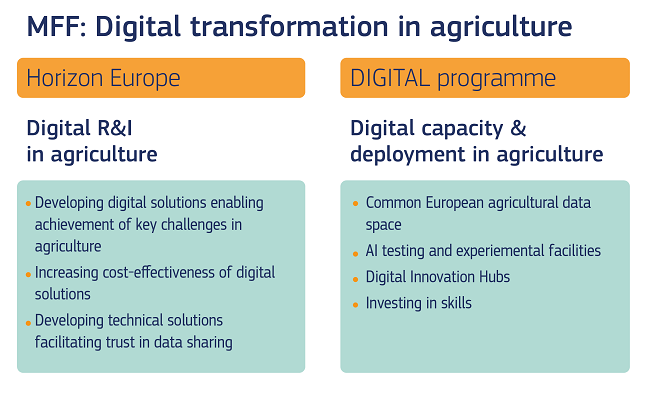
Horizon Europe
Horizon Europe, the European Union's research, and innovation framework programme, places a strong emphasis on the development of sustainable and inclusive food systems through research and innovation in the agri-food sector. In fact, under Pillar II, Cluster 6, substantial funding has been allocated to support projects related to food, bioeconomy, natural resources, agriculture, fisheries, aquaculture, and the environment, including the use of digital solutions for the agricultural sector.
More specifically, in the Work Programme 2021-2022, under Food, Bioeconomy, Natural Resources, Agriculture and Environment, under the topics of Effects of data sharing and big data and Upscaling (real-time) sensor data for EU-wide monitoring of production and agri-environmental conditions the following projects are highlighted:
ScaleAgData
ScaleAgData aims at contributing to the overall competitiveness and sustainability performance of the European agricultural sector, and to the work of the HE candidate partnership "Agriculture of Data" and the Soil Mission.
| ScaleAgData Facts |
| Timeline: 01.11.2023 – 31.12.2026 |
| Total cost: € 7 496 557,75 |
| Information: Website, Use cases, Factsheet |
CrackSense
CrackSense aims to address the problem of fruit cracking in citrus, pomegranate, table grapes and sweet cherries by developing and upscaling sensing technologies that will provide real-time sensor data through piloting activities. The sensor data collected will be upscaled into EU-wide data sets which will encompass Earth Observation Data (provided by Copernicus, e.g., Sentinel) and other data sets reflecting on environmental conditions. This data will be used to monitor agricultural production of the studied crops and enable farmers and growers’ efficient management of their resources and sustainability of their actions. By improving the agricultural production of these crops, CrackSense will as well help in creating a model for other agricultural crops.
| CrackSense Facts |
| Timeline: 01.11.2023 – 31.12.2026 |
| Total cost: € 7 499 293,75 |
| Information: Website, Factsheet |
AgriDataValue
AgriDataValue aims to establish itself as the "Game Changer" in Smart Farming and agri-environmental monitoring, and strengthen the smart-farming capacities, competitiveness, and fair income by introducing an innovative, intelligent, and multi-technology, fully distributed platform of platforms.
| AgriDataValue Facts |
| Timeline: 01.11.2023 – 31.01.2029 |
| Total cost: € 7 145 500,38 |
| Information: Website, Factsheet |
DIVINE
DIVINE aims to show the cost benefits and added value of sharing agri-data. To do this, it will develop an agri-data ecosystem that combines data already commonly shared while also using industry-led pilots that are devised on data-sharing plans. The results would support policy makers, technology providers, farm representatives and other agri-data stakeholders.
In addition, Cluster 4, Digital, Industry and Space, will test and validate innovative technologies such as IoT, cloud and edge computing, AI, robotics, and blockchain through use cases in agriculture. By applying advanced technologies like drones, smart IoT, AI, and real-time sensor data upscaling, as well as 5G and edge solutions for remote farming, the potential benefits for the agri-food sector are vast.
Furthermore, cross-benefit analysis and potential market exploration will be conducted to ensure a roadmap for the adoption of these technologies in the sector.
| DIVINE Facts |
| Timeline: 01.10.2022 – 30.09.2025 |
| Total cost: € 3 954 797,50 |
| Information: Website, Factsheet |
DIGITAL
The Digital Europe Programme (DIGITAL) programme offers a comprehensive approach to fostering innovation and digital transformation in the agricultural sector. It includes a range of initiatives aimed at increasing the economic and environmental performance of the sector, optimising the use of natural resources, and contributing to the Green Deal and Common Agricultural Policy objectives.
One key aspect of the programme is the establishment of a common European agricultural data space, which will enable secure and responsible data exchange, processing, and analysis to optimise natural resource use and drive data-driven innovations in the agriculture sector. The consortium brings together a team of experts from research institutes, agriculture data intermediaries, and industry associations from 10 countries, who will work with stakeholders to map the current data sharing landscape, analyse governance and business models, and define a technical reference architecture for implementing the EU data space for Agriculture.
| AgriDataSpace Facts |
| Timeline: 01.10.2022 – 31.03.2024 |
| Information: Website |
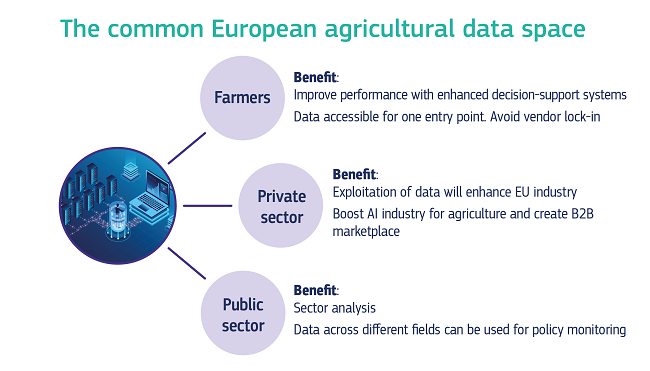 Another important initiative is the development of world-class, large-scale reference Testing and Experimentation Facilities (TEF) for AI in the agri-food sector. This will provide services that help assess and validate third party AI and Robotics solutions in real-world conditions aiming to maximise impact from the digitalisation of the agricultural sector.
Another important initiative is the development of world-class, large-scale reference Testing and Experimentation Facilities (TEF) for AI in the agri-food sector. This will provide services that help assess and validate third party AI and Robotics solutions in real-world conditions aiming to maximise impact from the digitalisation of the agricultural sector.
| AgrifoodTEF Facts |
| Information: Website |
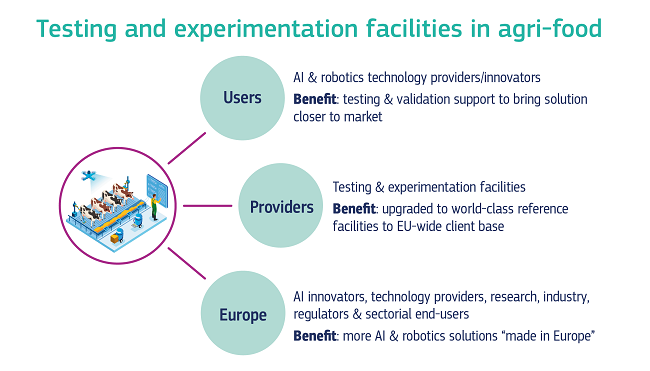 In addition, the programme includes the creation of European Digital Innovation Hubs (EDIHs), which will provide technological expertise and experimentation facilities to enable the digital transformation of the industry and the public sector. These EDIHs will build on the experiences and lessons learned from existing DIHs such as SmartAgriHubs and AgroRobofood.
In addition, the programme includes the creation of European Digital Innovation Hubs (EDIHs), which will provide technological expertise and experimentation facilities to enable the digital transformation of the industry and the public sector. These EDIHs will build on the experiences and lessons learned from existing DIHs such as SmartAgriHubs and AgroRobofood.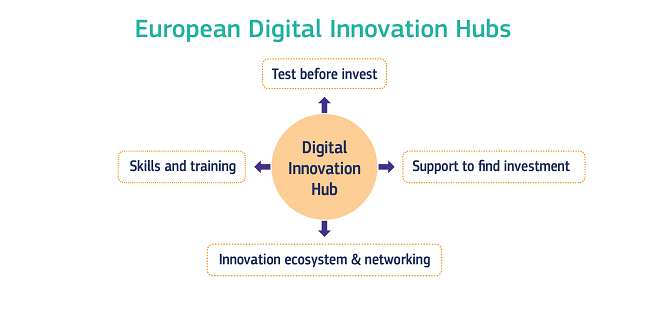 Finally, the success of these initiatives will depend on the digital skills of farmers and other agricultural professionals. To that end, the programme includes investments in enhancing the digital skills of farmers through specialised education programmes or modules, and support for the design and implementation of specific courses in digital technologies for professionals in the agricultural sector.
Finally, the success of these initiatives will depend on the digital skills of farmers and other agricultural professionals. To that end, the programme includes investments in enhancing the digital skills of farmers through specialised education programmes or modules, and support for the design and implementation of specific courses in digital technologies for professionals in the agricultural sector.
How could the European Cloud & Edge strategy impact the agricultural sector?
The European Cloud & Edge strategy, funded under the DIGITAL programme, is expected to have a significant impact on the agricultural sector by enabling the full use of cloud-to-edge infrastructures and services for the common European agricultural data space.
How will the European Strategy for Data affect the agricultural sector?
The European Strategy for Data will create a single market for data and establish a common European agricultural data space. The European Data Governance Act will increase trust in B2B data sharing, while the Data Act aims to stimulate the use of privately-held data by governments and address data access and use issues in B2B settings. Public sector high-value datasets will also be made available for reuse.
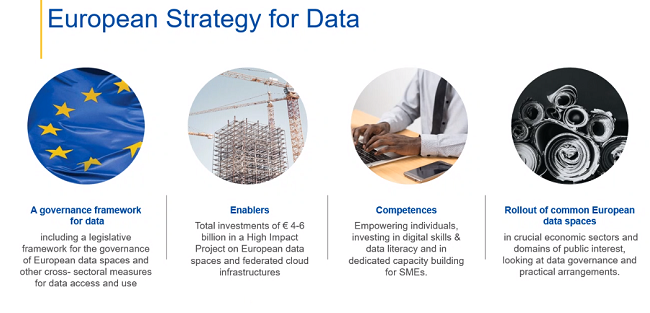 Collaboration is key for Europe's success
Collaboration is key for Europe's success
Collaboration is key to unlocking Europe's potential in the digitalisation of agriculture. The European Commission is leading by example through close collaboration between DG CNECT and DG AGRI. It is essential that all stakeholders work together to achieve success.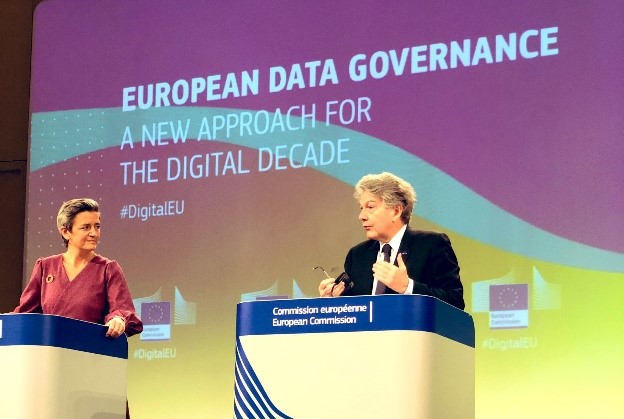
To achieve the benefits of digital transformation, communication between farmers, agricultural machine manufacturers, cooperatives, pesticide suppliers, and public and private actors such as digital and agricultural ministries must be facilitated. Through collaboration and effective communication, we can overcome the challenges and realise the full potential of digitalisation in agriculture.
What are the main objectives of the new Common Agricultural Policy?
The new Common Agricultural Policy 2023-27 is structured around 10 objectives, including a cross-cutting objective on digitalisation, knowledge, and innovation. Member States can use CAP tools to boost digitalisation in agriculture and rural areas.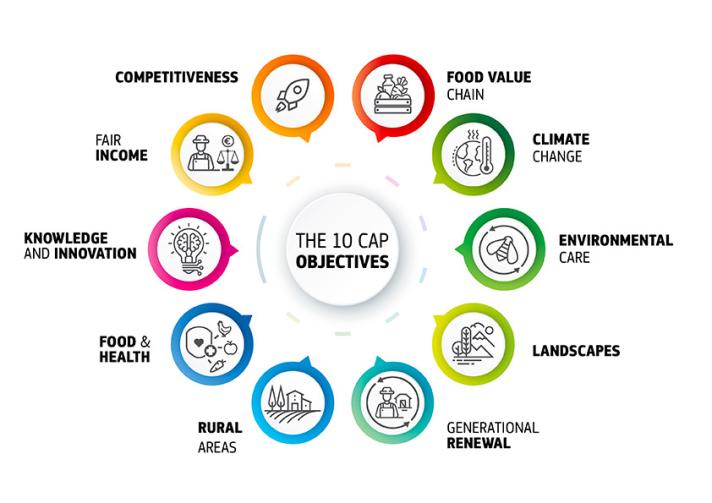
More information is available on the Common Agricultural Policy home page.
What about the Farm to Fork strategy?
The Farm to Fork strategy is a pillar of the EU Green Deal, with challenging 2030 targets for sustainable food production that require digital solutions. An IoF2020 use case on arable farming successfully used IoT technologies to optimise pesticide use and make crops safe for consumption. The European Commission will support the research, development, and deployment of next-generation cloud infrastructures and services across the EU, and the launch of the European Alliance for Industrial Data, Edge & Cloud to coordinate investment efforts and strengthen Europe's position in the global cloud and edge computing market.
More information is available on Farm to Fork strategy home page.
Related Content
Big Picture
Explore on this site

The strategy for data focuses on putting people first in developing technology, and defending and...
